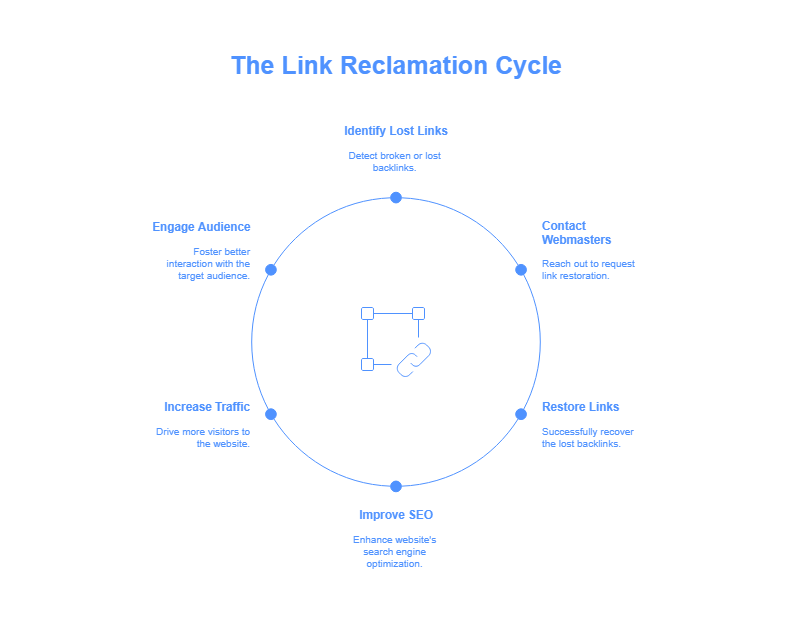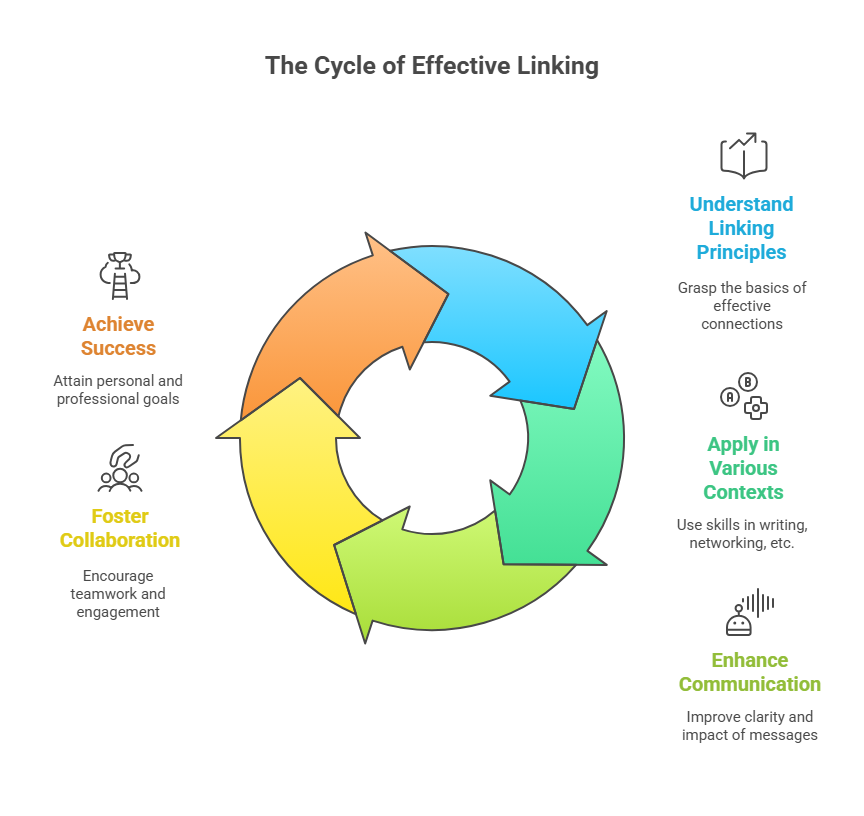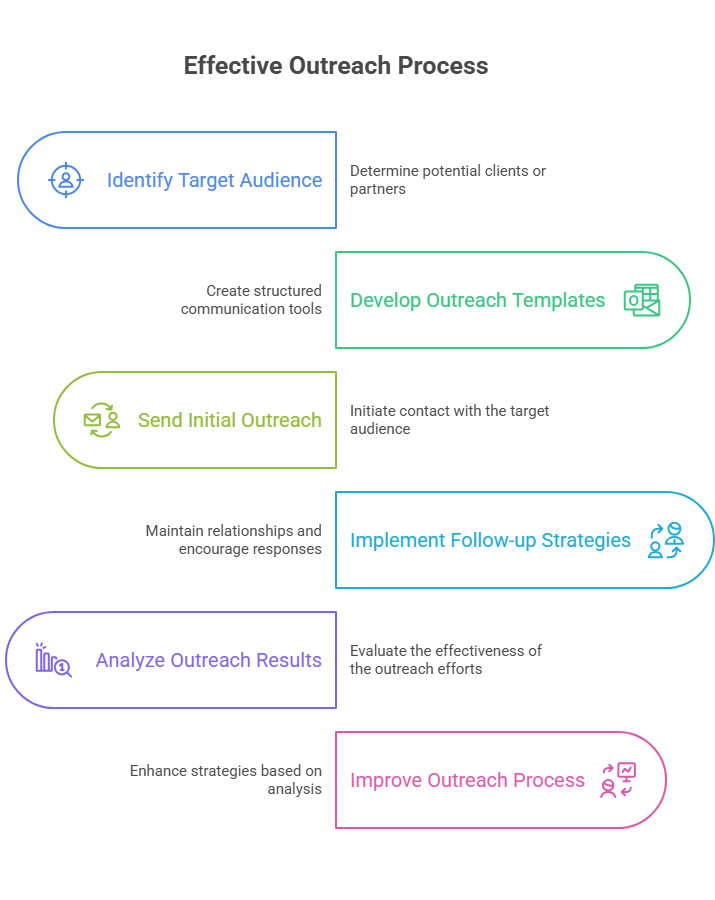Want to boost your SEO without building new links?
Link reclamation is one of the most efficient ways to recover lost SEO value and improve rankings without the heavy lifting. In this comprehensive guide, you’ll learn exactly how to find and fix broken, lost, or unlinked brand mentions using proven strategies that work in 2025.
According to Ahrefs 2025 Link Building Report, businesses that actively pursue link reclamation see an average of 23% improvement in organic traffic within six months.
This isn’t about chasing new links – it’s about reclaiming what you’ve already earned.
What Is Link Reclamation and Why It Matters for Your SEO

Link reclamation is the systematic process of identifying and fixing backlinks that point to your website but are broken, missing, or not properly attributed. Think of it as digital archaeology – uncovering buried SEO treasure that already belongs to you.
“Link reclamation is the lowest-hanging fruit in link building. You’re essentially recovering assets you’ve already earned through great content and relationships.” – Brian Dean, Backlinko
The beauty of link reclamation lies in its efficiency. Instead of spending weeks pitching new websites for links, you’re simply fixing what already exists. Recent data from SEMrush’s 2025 Link Building Study shows that link reclamation campaigns have success rates between 25-40%, significantly higher than cold outreach campaigns that average 8-15%.
Why Link Reclamation Should Be Your Priority
- Higher success rates: People are more willing to fix existing content than create new links
- Faster results: No relationship building required – the connection already exists
- Cost-effective approach: Maximizes your existing marketing investments
- Improves user experience: Fixes broken links that frustrate visitors
- Maintains link equity: Prevents valuable link juice from being wasted
Types of Links You Can Reclaim
- Broken backlinks: Links pointing to pages that return 404 errors
- Unlinked brand mentions: Text mentions of your brand without clickable links
- Incorrect links: Links pointing to wrong URLs or misspelled domains
- Redirect chains: Links going through multiple redirects, losing link equity
- Lost internal links: Your own site’s internal links broken during redesigns
- Citation corrections: Incorrect company information in directories and listings
Step 1: Finding Lost and Broken Links Like a Pro
Before you can reclaim links, you need to find them systematically. The most successful link reclamation campaigns start with comprehensive auditing using the right tools and techniques.

Essential Tools for Link Discovery
- Ahrefs Site Explorer: Use “Lost Backlinks” and “Broken Backlinks” reports with alerts for real-time monitoring
- SEMrush Backlink Audit: Excellent filters for lost links with contextual information
- Google Search Console: Free tool showing 404 errors with inbound links in Coverage reports
- Majestic SEO: Historical link data for identifying patterns in link loss
- Monitor Backlinks: Specialized tool for real-time link monitoring and alerts
“The key to effective link reclamation is setting up monitoring systems that catch broken links quickly. The sooner you reach out, the higher your success rate.” – Tim Soulo, Ahrefs
Advanced Google Search Operators for Link Discovery
Supplement your tools with these search operators to find unlinked mentions:
- “Your Brand Name” -site:yourwebsite.com: Finds mentions excluding your own site
- “Your Brand Name” + “review” -site:yourwebsite.com: Targets review mentions
- “Your Company” + “case study” -site:yourwebsite.com: Finds case studies mentioning you
- “Your Product” + “alternative” -site:yourwebsite.com: Discovers comparison content
Setting Up Your Monitoring System
Create an automated workflow that catches issues before they become major problems:
- Weekly Ahrefs alerts for lost backlinks to your domain
- Google Search Console notifications for new 404 errors
- Monthly data exports to track trends and patterns
- Brand mention alerts using Google Alerts or Mention.com
- Competitor monitoring to identify new opportunity patterns
Step 2: Discovering and Converting Unlinked Brand Mentions
Unlinked brand mentions represent some of the easiest link building opportunities available. Every day, people mention brands, products, and companies online without linking to them – and each mention is a potential quick win.
According to Moz’s 2025 Link Building Research, businesses that actively monitor and convert unlinked mentions see an average conversion rate of 32% – nearly four times higher than cold outreach efforts.
Comprehensive Mention Discovery Strategy
- Google Alerts: Set up alerts for brand name, executives, and key product names
- Mention.com or Brand24: Advanced social media monitoring with sentiment analysis
- Ahrefs Content Explorer: Search for brand mentions and filter out existing links
- BuzzSumo: Find mentions in high-authority publications and social media
- Talkwalker: Multi-platform monitoring across different languages
The High-Converting Outreach Template
When reaching out about unlinked mentions, focus on appreciation and easy implementation:
Subject: Thank you for mentioning [Brand Name]! Hi [Name], I just discovered your excellent article about [Topic] and wanted to thank you for mentioning [Brand Name] - really appreciate the kind words! If it would be helpful for your readers, feel free to link to our [specific resource] where they can [specific benefit]: [URL] I noticed you also mentioned [relevant point from article] - we actually have some updated data on that topic if it would be useful for future content. Thanks again for the mention! Best regards, [Your Name] [Title] [Company]
Advanced Mention Reclamation Tactics
- Offer additional value: Provide updated statistics, high-res images, or expert quotes
- Suggest specific placement: Recommend exactly where the link would fit naturally
- Provide multiple options: Offer different pages based on context relevance
- Follow up strategically: Space follow-ups 5-7 days apart, maximum of 2 attempts
Step 3: Prioritizing Link Reclamation Opportunities for Maximum Impact
Not all broken links deserve equal attention. A strategic approach to prioritization ensures you focus your time and energy on opportunities that will actually move the needle for your SEO performance.
“Successful link reclamation is about quality over quantity. I’d rather fix 10 high-authority, relevant links than 100 low-value ones.” – Rand Fishkin, SparkToro
The Link Value Scoring Framework
Score each opportunity using these weighted factors:
- Domain Authority (Weight: 25%): Use Ahrefs DR or Moz DA – prioritize domains with DR 30+
- Topical Relevance (Weight: 35%): Most important factor – industry relevance beats high authority
- Page Traffic (Weight: 20%): Use Ahrefs to check organic traffic to the linking page
- Link Context (Weight: 15%): Editorial mentions in content body vs sidebar/footer placement
- Brand Relationship (Weight: 5%): Existing relationship with the website owner or author
Quick Qualification Checklist
For rapid decision-making, ask these three questions:
- Recognition test: Is this a website I recognize and respect in my industry?
- Customer value test: Would I want my potential customers to read this content?
- User experience test: Does the broken link significantly hurt the reader’s experience?
If you answer yes to all three, it’s worth pursuing regardless of domain metrics.
Batch Processing for Efficiency
Organize your opportunities into these priority tiers:
- Tier 1 (Immediate action): High DA + high relevance + good traffic
- Tier 2 (Within 2 weeks): Medium DA + high relevance OR high DA + medium relevance
- Tier 3 (Monthly cleanup): Lower priority but still valuable opportunities
- Archive: Low-value opportunities not worth pursuing
Step 4: Proven Outreach Templates and Follow-up Strategies
The success of your link reclamation efforts hinges on effective outreach. The right email approach can turn a broken link into a restored connection and sometimes even a stronger business relationship.

The Broken Link Fix Template
Subject: Quick fix needed for [Specific Page Title] Hi [Name], I was reading your comprehensive guide on [Topic] and found it incredibly valuable, especially your insights on [specific point]. I noticed the link to [Your Resource] in section [X] appears to be broken. The updated URL is: [New URL] This resource has been updated with [specific improvement/new data] that I think your readers will find even more helpful. Thanks for creating such valuable content! Best regards, [Name] [Title] [Company]
The Value-Added Approach Template
Subject: Resource update + additional value for [Article Topic] Hi [Name], Your article on [Topic] is fantastic - really appreciate the thorough coverage of [specific aspect]. I noticed the link to our [Resource] might be outdated. Here's the current link: [URL] Also, since you covered [related topic], I thought you might find our new [related resource] useful for your readers: [URL]. It includes [specific valuable information] that complements your article perfectly. Feel free to use it if it adds value! Best, [Name]
Strategic Follow-up Sequence
Follow-up 1 (7 days later):
Subject: Re: Quick fix needed for [Page Title] Hi [Name], Just wanted to follow up on my previous email about the broken link in your [Article Topic] piece. Here's that updated URL again: [URL] I know you're probably busy, so no worries if this got buried in your inbox. Just wanted to make sure your readers can access the resource! Thanks, [Name]
Follow-up 2 (14 days after first follow-up):
Subject: Alternative solution for [Article Topic] Hi [Name], I understand you're likely swamped with priorities. If updating the original link isn't feasible, we actually have a [alternative resource] that might be even more relevant for your [Article Topic] piece: [URL] Either way, thanks for the original mention - really appreciate it! Best, [Name]
Email Best Practices for Higher Response Rates
- Specific subject lines: Reference the exact page or article title
- Personal connection: Mention specific content from their article
- Clear value proposition: Explain how fixing the link helps their readers
- Professional signature: Include full contact information and company details
- Optimal timing: Send Tuesday-Thursday, 10 AM-2 PM in their time zone
- Mobile-friendly format: Keep emails concise and scannable
“The best link reclamation emails don’t feel like link building – they feel like customer service. You’re helping someone improve their content.” – Ann Smarty, Internet Marketing Ninjas
Step 5: Monitoring Results and Building Sustainable Systems
Link reclamation isn’t a one-time project – it’s an ongoing process that requires systematic monitoring and optimization. The most successful practitioners build sustainable workflows that continue generating results with minimal ongoing effort.
Essential Tracking Metrics
Monitor these key performance indicators to optimize your approach:
- Discovery rate: Number of broken links or unlinked mentions found per month
- Outreach volume: Total emails sent and response rate percentage
- Conversion rate: Percentage of outreach attempts that result in fixed links
- Time to resolution: Average days from discovery to successful link restoration
- Link quality metrics: Average domain rating and relevance scores of reclaimed links
- Traffic impact: Organic traffic increases from reclaimed link equity
Monthly Link Reclamation Workflow
Implement this systematic approach for consistent results:
- Week 1 – Discovery Phase: Run audits using your monitoring tools, export new broken links and unlinked mentions
- Week 2 – Qualification Phase: Score opportunities using your framework, prioritize top prospects
- Week 3 – Outreach Phase: Send initial emails to Tier 1 prospects, update tracking spreadsheet
- Week 4 – Follow-up Phase: Send follow-ups to non-responders, analyze response patterns
Automation Tools for Scaling
- Pitchbox: Advanced outreach management with personalization and analytics
- BuzzStream: Relationship management focused on building long-term connections
- Airtable: Custom database for tracking opportunities with advanced filtering
- Zapier integrations: Connect monitoring tools to tracking systems automatically
Quarterly Optimization Review
Every three months, analyze your data to improve performance:
- Template performance: Which email approaches generated the highest response rates?
- Website patterns: What types of sites were most responsive to outreach?
- Timing optimization: When did you get the best response rates?
- Resource allocation: Which activities provided the highest ROI?
Real Case Studies: Link Reclamation Success Stories
Real-world examples demonstrate the tangible impact of systematic link reclamation efforts across different industries and business sizes.
Case Study 1: B2B SaaS Company Recovers 89 Links in 90 Days
Challenge: TechFlow, a project management platform, lost 347 backlinks over 18 months due to URL restructuring and broken external links.
Strategy Implementation:
- Identified 180 high-value broken link opportunities using Ahrefs
- Prioritized links from business and productivity websites with DR 30+
- Created personalized outreach emphasizing user experience improvements
- Offered updated screenshots and additional resources to add value
Results Achieved:
- Sent 142 outreach emails with 34% response rate
- Successfully reclaimed 89 links (27% success rate)
- Average domain rating of restored links: 45
- Organic traffic increased 31% within four months
- Three target pages reached first page rankings
Case Study 2: E-commerce Brand Converts Unlinked Reviews
Challenge: Outdoor gear company had extensive product mentions across hiking and camping blogs but only 35% included actual links.
Strategic Approach:
- Used Brand24 to identify 156 unlinked product mentions
- Focused on outdoor lifestyle websites with engaged communities
- Provided high-resolution product images and detailed specifications
- Offered exclusive discount codes for website audiences
Business Impact:
- Converted 67 unlinked mentions into linked references
- SEO-driven revenue increased 24% over six months
- Product page rankings improved for 23 target keywords
- Built ongoing relationships with 15 influential outdoor bloggers
Advanced Link Reclamation Strategies for 2025
As link reclamation becomes more mainstream, advanced practitioners are developing sophisticated approaches that go beyond basic broken link fixes.
The Competitor Mention Strategy
Identify articles mentioning competitors and position yourself as an additional valuable resource:
- Use Ahrefs Content Explorer to find competitor mentions
- Target comparison articles, industry roundups, and resource lists
- Offer complementary perspective rather than replacement
- Provide unique data or insights not available from competitors
Historical Content Update Approach
Target older content with outdated information for comprehensive updates:
- Find industry articles from 2-3 years ago using date filters
- Identify outdated statistics, broken tool links, or obsolete recommendations
- Offer current data and modern alternatives
- Position your outreach as helping maintain content accuracy
Multi-Media Mention Reclamation
Expand beyond text-based mentions to video and podcast content:
- Monitor YouTube and podcast platforms for brand mentions
- Reach out to creators for description links and show notes
- Offer additional resources mentioned in their content
- Provide transcript excerpts for easier content integration
“The future of link reclamation is about building relationships, not just fixing links. Every successful reclamation should open the door for future collaboration.” – Marie Haynes, Marie Haynes Consulting
Common Pitfalls and How to Avoid Them
Learning from common mistakes can significantly improve your link reclamation success rate and protect your brand reputation.
Critical Mistakes to Avoid
- Over-aggressive follow-up: Never send more than two follow-ups spaced a week apart
- Generic template usage: Always personalize with specific content references
- Homepage-only linking: Suggest the most contextually relevant page for better acceptance
- Ignoring smaller websites: Niche relevance often trumps high domain authority
- Poor tracking practices: Maintain detailed records for relationship management and optimization
Quality Control Checklist
Before sending any outreach email, verify:
- Correct contact name and website reference
- Specific article or page title mentioned
- Accurate destination URL provided
- Clear value proposition for their audience
- Professional email signature with complete contact information
Measuring ROI and Long-term Impact
Track these advanced metrics to demonstrate the business value of your link reclamation efforts:
SEO Performance Indicators
- Organic traffic growth: Monitor increases from pages with reclaimed links
- Keyword ranking improvements: Track position changes for target terms
- Domain authority progression: Measure overall domain strength improvements
- Page-level authority gains: Monitor individual page strength increases
Business Impact Metrics
- Referral traffic quality: Analyze engagement from reclaimed links
- Conversion rate improvements: Track goal completions from organic traffic
- Brand mention sentiment: Monitor changes in online brand perception
- Relationship development: Count ongoing partnerships formed through outreach
According to Search Engine Land’s 2025 Link Building ROI Study, businesses implementing systematic link reclamation see an average 340% return on investment within the first year.
Conclusion: Transform Your SEO with Strategic Link Reclamation
Link reclamation represents one of the highest-impact, lowest-risk strategies in modern SEO. While competitors invest months building relationships for new links, you can achieve similar results in weeks by systematically reclaiming what you’ve already earned.
The key to success lies in building sustainable systems rather than treating this as a one-time project. Implement automated monitoring, develop efficient workflows, and focus on quality opportunities that align with your business goals.
Your 30-day action plan:
- Week 1: Set up monitoring in Ahrefs and Google Search Console
- Week 2: Complete your first comprehensive audit and identify top 20 opportunities
- Week 3: Launch initial outreach campaign using proven templates
- Week 4: Implement tracking system and schedule ongoing monitoring
Remember that every broken link you fix restores valuable SEO equity, and every unlinked mention you convert represents easy authority gains. In an increasingly competitive digital landscape, this systematic approach to link reclamation can provide the edge your business needs to achieve sustainable organic growth.
Start with your highest-value opportunities today, build momentum through early wins, and develop the systematic approach that will continue delivering results for years to come.


